











4-27-17
With warmer weather and sunnier skies comes the temptation
for both humans and felines to bask in its welcome arrival. And
that means windows thrown open and doors left ajar.
But for cat owners living in buildings of two stories and more –
beware. Why? Because lurking in the light is a dark threat that’s
commonly called High Rise Syndrome.
High Rise Syndrome describes the phenomenon of cats falling
from heights greater than two stories (23-30 feet)) and refers
as well to the injuries they sustain from just such falls.
The Hazards of Heights
by Nomi Berger
Kitties usually find themselves in this predicament after being
startled from their perch – whether it’s on a window ledge, a rooftop
patio or a fire escape – and when they fall, they often suffer injuries
more extensive than mere broken bones, especially from heights
between two and seven stories. These injuries include bruising
to their heart and lungs, fractures of their lower jaw and the roof of
their mouth, swelling of their brain, ruptures of their urinary
bladder, internal bleeding, and fractures of their ribs.
Surprisingly, many cats falling from heights that exceed seven stories
sustain fewer and less severe injuries, thanks to their flexibility and
their ability to right their bodies and relax as they fall. But for those
less fortunate felines, the cost of treating severe High Rise Syndrome
is high (ranging from $2,000 to $5,000) and the process of their
being rehabilitated and restored to health is long and painful.
Depending on the severity of their injuries, these poor pets need true
intensive care, requiring a lengthy hospital stay that can include
anything from supplemental oxygen therapy and temporary feeding
tubes to one or more surgical procedures.
Since, according to the axiom, “An ounce of prevention is worth a
pound of cure”, there are several, simple ways for responsible cat
guardians to stop this scenario before it starts.
Install well-fitting and secure window screens on any windows you
intend to leave open. Whenever possible, open the top section of
your windows instead of the bottom. Close every window before
leaving your home and before starting such loud appliances as
the vacuum cleaner. Don’t allow your cat to remain on a balcony
unobserved, and never allow her to jump onto the railings. If you
have a patio, move all furniture away from the railings to help keep
her from using the back of a chair or the top of a table as a perch.
If, despite your precautions and best intentions, your kitty does fall,
bring her to your veterinarian or to the closest emergency clinic
immediately for assessment. Because the injuries she may have
sustained aren’t likely to be apparent to you, “at home” treatment
is NOT an option, and she may be in both shock and extreme pain.
Then, paws crossed, all will be well, and she’ll have another eight
lives to live, love and enjoy with you.

THANK YOU SO MUCH!!

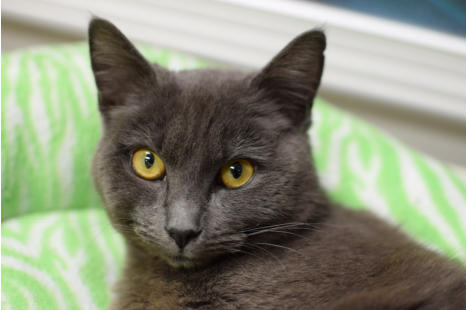
Meet Callie
Little Callie is a leukemia positive kitty.
Callie came to us from our vets office. Her owner had
brought her in to be spayed. When she tested leukemia
positive they asked that she be euthanized. Thank
goodness my vet will not kill a healthy cat that could have
several more years to live.
She is very sweet, gets along well with the other cats.
You may watch her 24 hours a day live on her
MeShare camera.
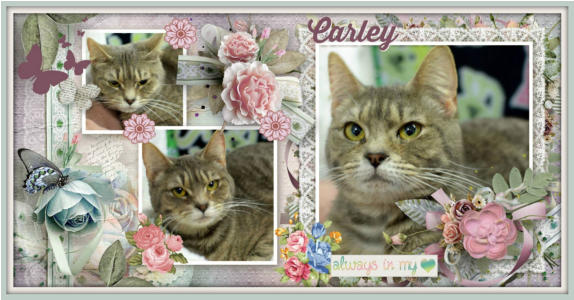
A sad goodbye - RIP Carley
Sweet Carley came to us only a month ago
from a severe hoarding situation. She was
also Leukemia positive. Sadly she developed wet FIP.
FIP is Feline Infectious Peritonitis. It is a viral
disease of cats caused by certain strains of a
virus called the feline coronavirus. Many cats
come in contact with this virus, do not show
any symptoms and an immune response occurs
with the development of antibodies. In a small percentage
(5 - 10 percent) infection developes into FIP.
In cats that develop FIP, the symptoms can appear to
be sudden since cats have an amazing ability to mask
disease until they are in a crisis state. Once symptoms
develop, othen there is increasing severity over the course
of a couple of weeks ending in death. Generally these
cats first develop nonspecific symptoms such as loss of
appetite, weight loss, fever, depression. In all the cases
we have seen over the years, weight loss is always the
symptom we see first.
There are 2 major forms of FIP, an effusive (wet) form and
a noneffusive (dry) form. Dry FIP symptons generally
include chronic weight loss, depression, animia and a
persistent fever that does not respond to antibiotic therapy.
The effusive form (wet) is characteried by a accumulation
of fluid in the abdomen and less commonly in the chest.
The wet form progresses rapidy. When it becomes
excessive, it may become difficult for the cat to
breath normally.
FIP can be difficult to diagnose because each cat can
display different symptoms that are similiar to those
of many other diseases. The only true way to definitively
diagnose FIP is biopsy or examination of tissues at autopsy.
Generally your vet may rely on a presumptive diagnosis
based on symptoms, blood work, examination of fluid if it
is present.
Here is Carley’s Blood work - When I saw her blood
work, I sadly was not surprised to see it develop into full
blown FIP.
Your generous donation of paw points
have earned another pallet of litter for the
cats! Thank you so so much!!
We use over 60 boxes each month,
this pallet will be a huge help!
Do You use your Paw Points?
If you do not use your points, please consider donating
them to the blind cats.
Link to donate points ==> http://ow.ly/lPoF302ojhP


High Protein, High Globulin, Low Albumin and an Alb/Glob ratio of .03
or lower has always ended up as FIP.
There is currently no cure for FIP, it is fatal. There are some
medicines that people try in desperation to save their cats.
We have never found any that changes the final outcome. There
is a study that was done that has promise. We talked to the doctor
who did the trial before we euthanized Carley. She said there is no
more of the medicine available and currently there are no trials.
A cure sadly is still several years out.
Thank you so much to everyone who came and
visited the cats for open house!!
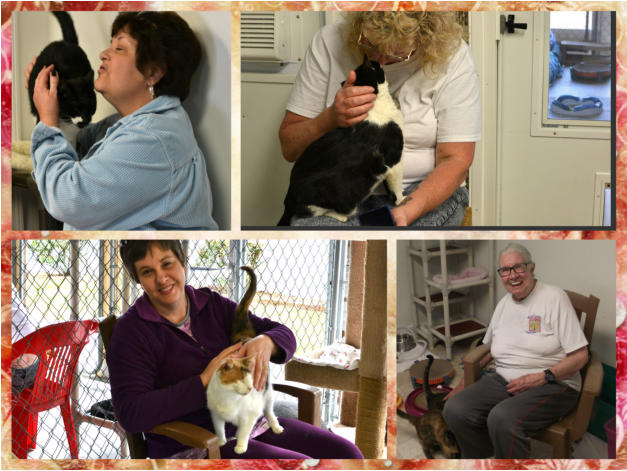
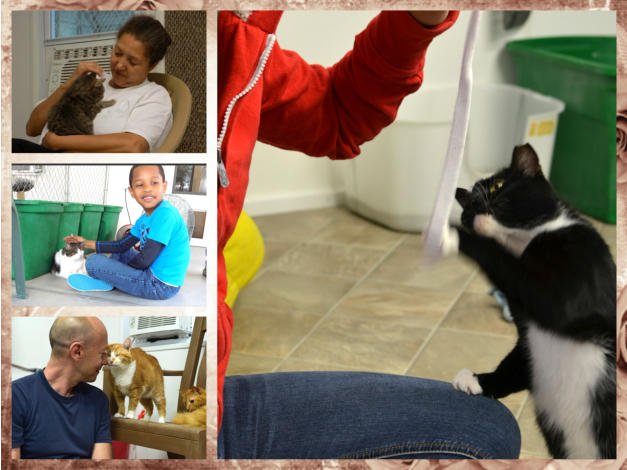
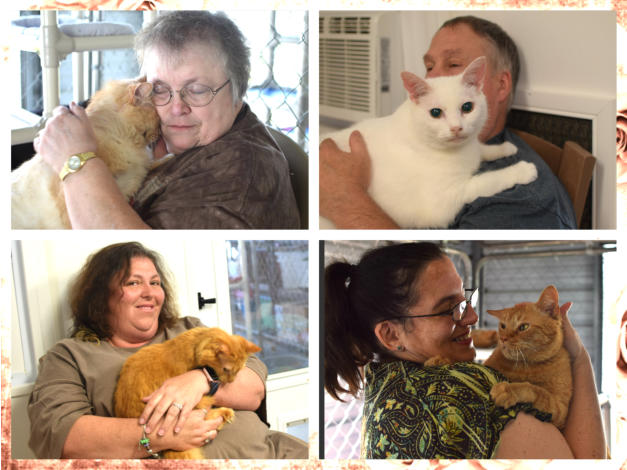

Thank you so much to our wonderful
eBay sellers and buyers for sharing
your auctions so generously with the cats!!!
We hope you will check out all their wonderful
auctions HERE Your generosity this month raised
$4213.13 !! Thank you so much!!!

Do you do the daily click? Every time
you click, they donate to the cats.
You may donate once a day on each
of your devices. Click HERE
Your generosity raised $4700 for the last
4 months of clicking! That pays lots of
vet bills! Thank you so much for helping!

The cats need you! Volunteers to help at the shelter and
play with the cats. Also needing board members.
Please email Alana alana@blindcatrescue.com If you can help.
Thank you for reading!
Did you know that if you click the previous button,
you may read older copies of the newsletters?



4-27-17
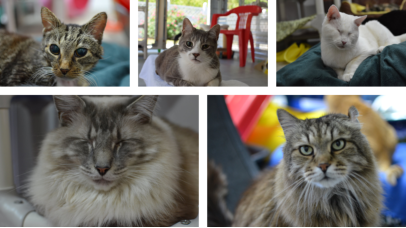
THANK YOU SO MUCH!!


Your generous donation of paw points
have earned another pallet of litter for the
cats! Thank you so so much!!
We use over 60 boxes each month,
this pallet will be a huge help!
Do You use your Paw Points?
If you do not use your points, please consider donating
them to the blind cats.
Link to donate points ==> http://ow.ly/lPoF302ojhP
Meet Callie
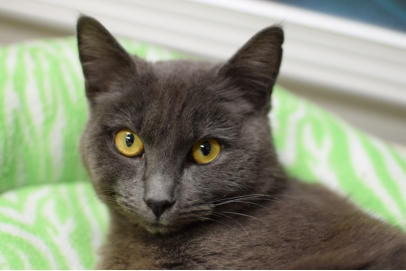
Callie came to us from our vets office. Her owner had
brought her in to be spayed. When she tested leukemia
positive they asked that she be euthanized. Thank
goodness my vet will not kill a healthy cat that could have
several more years to live.
She is very sweet, gets along well with the other cats.
You may watch her 24 hours a day live on her
MeShare camera.
A sad goodbye - RIP Carley
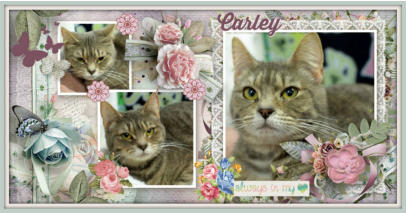
Sweet Carley came to us only a month ago
from a severe hoarding situation. She was
also Leukemia positive. Sadly she developed
wet FIP.
FIP is Feline Infectious Peritonitis. It is a viral
disease of cats caused by certain strains of a
virus called the feline coronavirus. Many cats
come in contact with this virus, do not show
any symptoms and an immune response occurs
with the development of antibodies. In a small
percentage (5 - 10 percent) infection developes
into FIP.
In cats that develop FIP, the symptoms can appear to
be sudden since cats have an amazing ability to mask
disease until they are in a crisis state. Once symptoms
develop, othen there is increasing severity over the course
of a couple of weeks ending in death. Generally these
cats first develop nonspecific symptoms such as loss of
appetite, weight loss, fever, depression. In all the cases
we have seen over the years, weight loss is always the
symptom we see first.
There are 2 major forms of FIP, an effusive (wet) form and
a noneffusive (dry) form. Dry FIP symptons generally
include chronic weight loss, depression, animia and a
persistent fever that does not respond to antibiotic therapy.
The effusive form (wet) is characteried by a accumulation
of fluid in the abdomen and less commonly in the chest.
The wet form progresses rapidy. When it becomes
excessive, it may become difficult for the cat to
breath normally.
FIP can be difficult to diagnose because each cat can
display different symptoms that are similar to those
of many other diseases. The only true way to definitively
diagnose FIP is biopsy or examination of tissues at autopsy.
Generally your vet may rely on a presumptive diagnosis
based on symptoms, blood work, examination of fluid if it
is present.
Here is Carley’s Blood work - When I saw her blood
work, I sadly was not surprised to see it develop into full
blown FIP.

High Protein, High Globulin, Low Albumin and an Alb/Glob ratio of .03
or lower has always ended up as FIP.
There is currently no cure for FIP, it is fatal. There are some
medicines that people try in desperation save their cats.
We have never found any that changes the final outcome. There
is a study that was done that has promise. We talked to the doctor
who did the trial before we euthanized Carley. She said there is no
more of the medicine available and currently there are no trials.
A cure sadly is still several years out.
Thank you so much to everyone who came and
visited the cats for open house!!
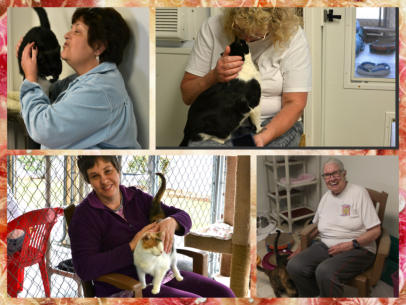
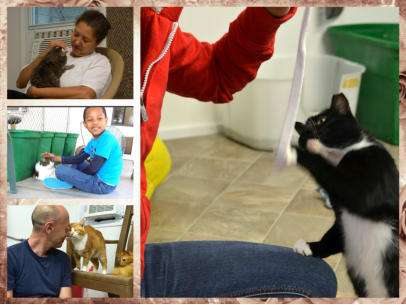
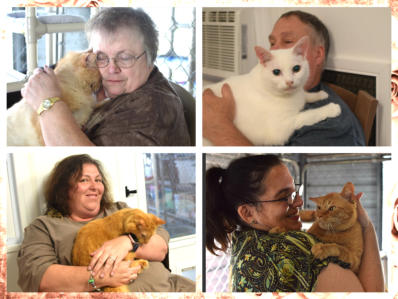

Do you do the daily click? Every time
you click, they donate to the cats.
You may donate once a day on each
of your devices. Click HERE
Your generosity raised $4700 for the last
4 months of clicking! That pays lots of
vet bills! Thank you so much for helping!
Thank you so much to our wonderful
eBay sellers and buyers for sharing
your auctions so generously with the cats!!!

The Hazards of Heights
by Nomi Berger
With warmer weather and sunnier skies comes the temptation
for both humans and felines to bask in its welcome arrival. And
that means windows thrown open and doors left ajar
But for cat owners living in buildings of two stories and more –
beware. Why? Because lurking in the light is a dark threat that’s
commonly called High Rise Syndrome.
High Rise Syndrome describes the phenomenon of cats falling
from heights greater than two stories (23-30 feet)) and refers
as well to the injuries they sustain from just such falls.
Kitties usually find themselves in this predicament after being
startled from their perch – whether it’s on a window ledge, a rooftop
patio or a fire escape – and when they fall, they often suffer injuries
more extensive than mere broken bones, especially from heights
between two and seven stories. These injuries include bruising
to their heart and lungs, fractures of their lower jaw and the roof of
their mouth, swelling of their brain, ruptures of their urinary
bladder, internal bleeding, and fractures of their ribs.
Surprisingly, many cats falling from heights that exceed seven stories
sustain fewer and less severe injuries, thanks to their flexibility and
their ability to right their bodies and relax as they fall. But for those
less fortunate felines, the cost of treating severe High Rise Syndrome
is high (ranging from $2,000 to $5,000) and the process of their
being rehabilitated and restored to health is long and painful.
Depending on the severity of their injuries, these poor pets need true
intensive care, requiring a lengthy hospital stay that can include
anything from supplemental oxygen therapy and temporary feeding
tubes to one or more surgical procedures.
Since, according to the axiom, “An ounce of prevention is worth a
pound of cure”, there are several, simple ways for responsible cat
guardians to stop this scenario before it starts.
Install well-fitting and secure window screens on any windows you
intend to leave open. Whenever possible, open the top section of
your windows instead of the bottom. Close every window before
leaving your home and before starting such loud appliances as
the vacuum cleaner. Don’t allow your cat to remain on a balcony
unobserved, and never allow her to jump onto the railings. If you
have a patio, move all furniture away from the railings to help keep
her from using the back of a chair or the top of a table as a perch.
If, despite your precautions and best intentions, your kitty does fall,
bring her to your veterinarian or to the closest emergency clinic
immediately for assessment. Because the injuries she may have
sustained aren’t likely to be apparent to you, “at home” treatment
is NOT an option, and she may be in both shock and extreme pain.
Then, paws crossed, all will be well, and she’ll have another eight
lives to live, love and enjoy with you.

The cats need you! Volunteers to help at the shelter and
play with the cats. Also needing board members.
Please email Alana alana@blindcatrescue.com If you can help.











